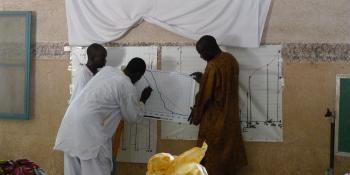Located in the heart of West Africa, Mali is a Sahelian country that covers a total area of 1,241,238 km². There are three seasons in Mali: the cool season from November to March, the hot season from April to June and the rainy season, which manifests itself through nocturnal thunderstorms from July to October.
Agriculture is extremely important to Malian people and their economy. About 80% of the population derive their income from agriculture and the Malian government has identified agricultural development as the country’s main engine of economic growth, poverty reduction and food security. Agriculture creates jobs, generates income, puts food on the table and improves the living environment of the Malian people. As such, it is central to economic and social stability in the country.
This economic and social stability is now threatened by climate change. Already an increase in temperature, a decrease in rainfall and an increase in desertification can be observed. It is also expected that there will be an increase in extreme weather events like droughts and floods. This increasing climate variability and change exacerbates human pressures on land, water and other natural resources. Making matters worse, many Malian producers live on small scale family farms which are extremely vulnerable to climate change.
The government and its partners are hard at work through legislation and national programs to help combat the many challenges that climate change will bring.
Key initiatives in Mali
Climate-smart village: In West Africa, CCAFS is working with several partners to develop climate-smart villages. A climate-smart village a site where farmers work with researchers and other local partners to test a portfolio of climate-smart technologies and practices. Projects are implemented in an integrated manner in order to realize the triple benefits of climate-smart agriculture: productivity, adaptation and mitigation. In Mali, the CCAFS climate-smart village is located in Cinzana, Ségou region. Read more : Developing Climate-Smart Village models in West Africa.
National science-policy dialogue platforms: In Mali, CCAFS is helping to develop a national science-policy dialogue platform: a network of national stakeholders, including scientists and policy makers, who regularly exchange knowledge on adaptation to climate change. Read more: How can effective dialogue be established between researchers and policy makers on climate change adaptation in Mali
Climate-Smart Agriculture Alliance: Mali is a member of the Climate-Smart Agriculture Alliance launched in June 2015, in Mali. This alliance, in partnership with both Economic Community Of West African States (ECOWAS) and CCAFS, aims to increase farm productivity and incomes sustainably and equitably, to enhance adaptation and resilience to climate variability and change, and to control and reduce greenhouse gas emissions wherever possible and appropriate, at a regional level.


